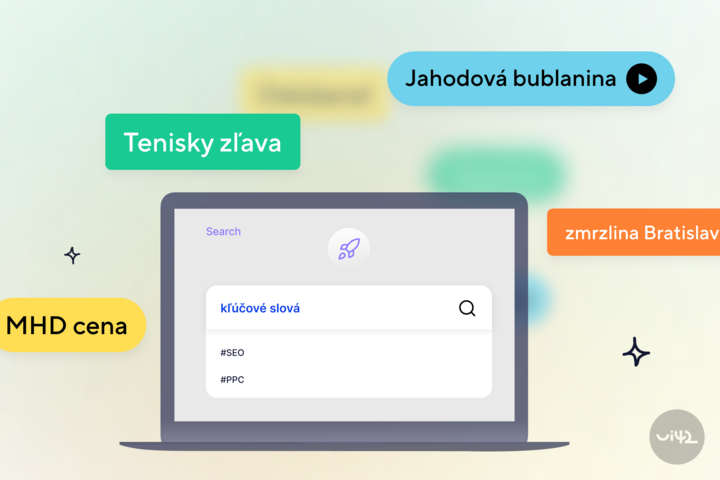Keyword research is the cornerstone of SEO, as well as paid PPC advertising. In other words, it is essential for your website to appear in search results as high as possible. Thanks to keyword research, you can promote your online business more effectively. It is a summary of terms that your potential customers enter into the search engine.

What are keywords?
Keywords are the precise terms and phrases that people enter into a search engine. The search engine then selects the most relevant queries for the entered keywords and displays them in the search results. The goal of every website is to rank on the highest positions in the search results, as these are the ones that people click on the most. This can be achieved through appropriate optimization of the pages for the selected keywords or paid advertising that is based on keywords.
What types of keywords do we know?
There are several types of keywords. They are divided according to several parameters or the search intent with which people search for them.
Keyword length
Keyword is a term in online marketing that does not always mean a single-word expression. From this perspective, we know:
- Short tail keywords (short tail keywords) - these are general keywords that have a high search volume and cover too wide a range of interests (for example "television", "washing machine", "sports" and similar).
- Long tail keywords - these keywords can be more accurately called phrases because they consist of multiple words. They determine a closer search intent and define a narrower area of search queries. A long tail keyword can have up to three or four words (for example "small TV for the bedroom", "quiet washing machine from above", "sports in bad weather" and similar).
Main versus long tail keywords. Which to use?
From the perspective of search volume, it applies that long tail expressions generally have a lower search volume. However, this is not a reason not to use them for page optimization. On the contrary, due to the lower level of competition, they represent an ideal way to rank on good positions in the search results. However, it is not always easy to optimize a page for such a keyword. Why use them?
The overall character of search queries has changed. While in the past, short tail keywords were more common, with the increasing amount of content on the internet and the development of the search engine, people have learned to Google in order to get the most relevant results. They enter up to 91.8% of cases precisely long tail expressions into the search field.
Search intent
Keywords can also be divided according to their character or search intent, which reveals more about the motive for the search. Therefore, we know:
- Locational keywords - these are a combination of a main keyword and the place in which the user wants to localize it. An example is searching in a city, town, or state ("ice cream Bratislava", "public transport Šurany" and similar). These keywords play a major role in local SEO.
- Brand keywords - similarly to locational kw, they combine an object (usually a product) with a specific brand or manufacturer name ("Philips iron", "Dixie shampoo" and similar). These keywords are often part of product PPC campaigns.
- Transactional keywords - these are queries that combine a specific search intent expressed by a verb and the object that the person is interested in. These keywords should be included in the optimization of the subpages of an e-shop, for example, these are expressions such as "buy quality coffee", "order a massage" and similar.
- Informational keywords - in terms of search intent, they capture the customer at the stage where they are searching for information, for example using particles or specific questions, for example "how to sell on the internet", "how to order from Aliexpress" and similar.
ui42 TIPs: Informational keywords are a great basis for creating a blog post or other content on a website/social networks, which you can use to bring a potential customer directly to your products or services. If you have an e-shop with shoes, create a detailed guide on how to choose the right shoes. Use relevant keywords in it. If Google evaluates the content as useful (contains answers to the searched questions and unique information presented in a clear form), there is a high probability that the link to this page will be placed high in the search results. This means an increase in the chance that more people will click on the result, who will get to your pages directly. We wrote about how to convert them into customers in the article about content marketing.
Where to get keywords from?
It is quite possible to find out what people are searching for. There are a number of tools that you can use to get keywords related to your business. You can also get a lot of keywords yourself. Just think about your business core and how people might be searching for it. What are all the sources of keywords?
Tools and prompts
There are dozens of tools for obtaining keywords, which you can find in both free and paid versions. Examples are Google Keyword Planner, Marketing Miner, Keywordtool.io, Ubersuggest, and more. Google keywords even suggests them itself. Just pay attention to Related searches at the bottom of the page for main keywords.
-
Google Keyword Planner is a free tool from Google that allows you to research keywords, see their search volume, and get suggestions for related keywords.
-
Marketing Miner is a paid tool that provides more in-depth keyword research, including competitor analysis and keyword difficulty.
-
Keywordtool.io is a free tool that generates keyword suggestions based on a seed keyword.
-
Ubersuggest is a paid tool that provides keyword research, competitor analysis, and backlink analysis.
In addition to these tools, you can also get keyword ideas by:
-
Analyzing your website traffic: Use Google Analytics to see what keywords people are using to find your website.
-
Looking at competitor websites: See what keywords your competitors are using in their website titles, meta descriptions, and header tags.
-
Using keyword research tools: There are a number of free and paid keyword research tools available that can help you find relevant keywords.
-
Brainstorming: Think about the words and phrases that people are likely to use to search for your products or services.
Keyword analysis
Once you have a list of potential keywords, it is important to analyze them to see how relevant and competitive they are. The following factors should be considered when analyzing keywords:
-
Search volume: How many people are searching for the keyword each month?
-
Competition: How many websites are competing for the keyword?
-
Relevance: How relevant is the keyword to your website or product?
-
Intent: What is the intent of the keyword? Is it informational, navigational, transactional, or commercial?
-
Cost-per-click (CPC): If you plan to use paid advertising, how much will it cost to click on the keyword?
By analyzing these factors, you can determine which keywords are worth pursuing and which ones you should discard.
Using keywords in your content
Once you have a list of relevant keywords, you can start using them in your website content. However, it is important to use them naturally and avoid keyword stuffing. Keyword stuffing is the practice of overusing keywords in your content in an attempt to improve your search engine rankings. This can actually have the opposite effect and penalize your website.
Here are some tips for using keywords in your content:
- Use keywords in your website titles, meta descriptions, and header tags.
- Use keywords throughout your website content, including in your body copy, product descriptions, and blog posts.
- Use keywords naturally and avoid keyword stuffing.
- Use long-tail keywords, which are more specific and have less competition.
- Use keywords in your image alt tags.
By following these tips, you can use keywords effectively to improve your website's visibility and search engine rankings.












